Highlights
- When men have power to influence their mate options, they tend to use that power to find a peer-age woman for companionship in life. Post This
- What is perhaps most striking is that as income rises above the median, higher-earning men disproportionately marry women with identical educational attainment. Post This
- There is a correlation between high-income husbands and wives who stay home. For married men in the bottom percent of income, about 15-20% of their wives are stay-at-home wives. But for men in the top 5%, about 40% of wives stay home. Post This
If you have read any internet discourse about dating and relationships at all, you are probably familiar with a common argument: men would prefer an attractive, younger woman over an ambitious woman close to their age. This argument suggests that, at least when given a choice, men don’t prefer to marry women with career ambitions, but instead just select for physical attractiveness or fertility. But is this true?
Using data on 1.4 million married men in the 2019-2023 American Community Survey and their wives, I find that the answer is no. Overwhelmingly, it turns out that the men with the most relationship options (wealthier, higher-social-status men) marry women similar in age to them and with high educational attainment. That elite men are going to “marry a Waffle House waitress” (as the pejorative online stereotype puts it) because she’s pretty is a myth. Instead, relationships with large age gaps are more common for low-income men than for high-income men. Far from being a sign of wealth, marrying a much younger woman is associated with men who struggle to find a partner until later in life.
The real story is much simpler: what almost everybody wants in a marriage partner is someone who shares their outlook on the world. If you’re an ambitious striver, you’re probably interested in marrying an ambitious striver—or somebody complementary to one! Because people tend to match not only on traits like social class or education but also drive and ambition, it isn’t very likely that the high-income men of America will marry lower-income or less-educated women at high rates.
Rich Men Marry Age Peer Women
The figure below shows the share of married men ages 30 to 54 (so removing effects of retirement or schooling years biasing income estimates) who had a wife either 10 or more years older or 10 or more years younger than them, by the husband’s own income percentile (that is, his income rank among other husbands in this sample).
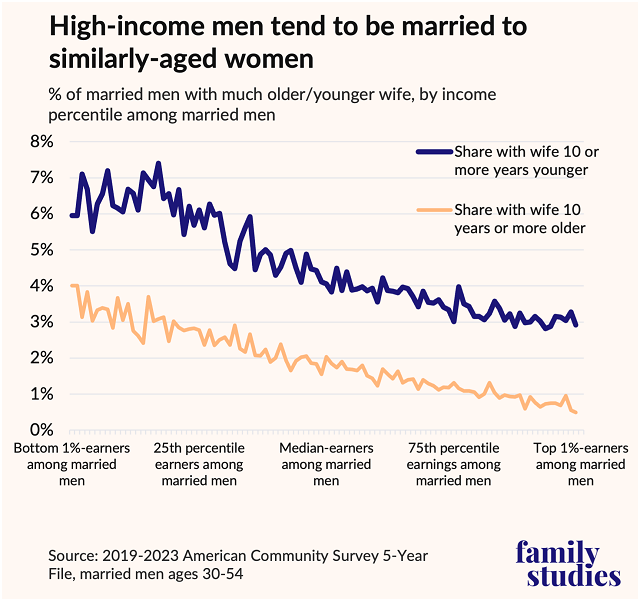
Poorer men are far likelier to have both younger and older wives. This doesn’t fit with the common idea that older men with abundant resources snap up young women as their brides. Rather, the simplest explanation for these trends is that high-earning men who have more romantic options prefer to marry women who are more like a peer. When men have power to influence their mate options, they tend to use that power to find a peer-age woman for companionship and partnership in life.
Even if we relax the age band to be women 5 or more years older or younger, these trends persist:
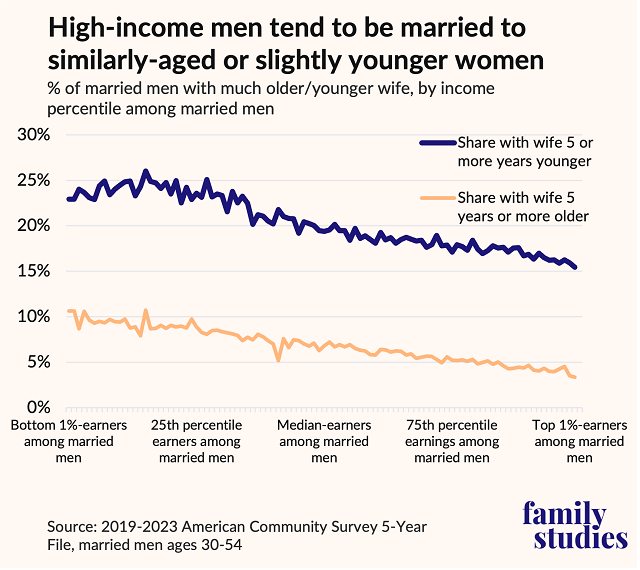
The share of husbands with wives who are younger by 5 years or more declines from around 25% for men at the 20th income percentile to 15% among men in the top 1% of married men’s earnings ($730,000 or more). By and large, most high-earning men are not looking to marry a much younger or a much older woman.
Rich Men Marry Highly-Educated Women
But what about education? Perhaps higher-earning men prefer age peers for companionship through the life cycle, but also prefer women whose educational accomplishments are less threatening.
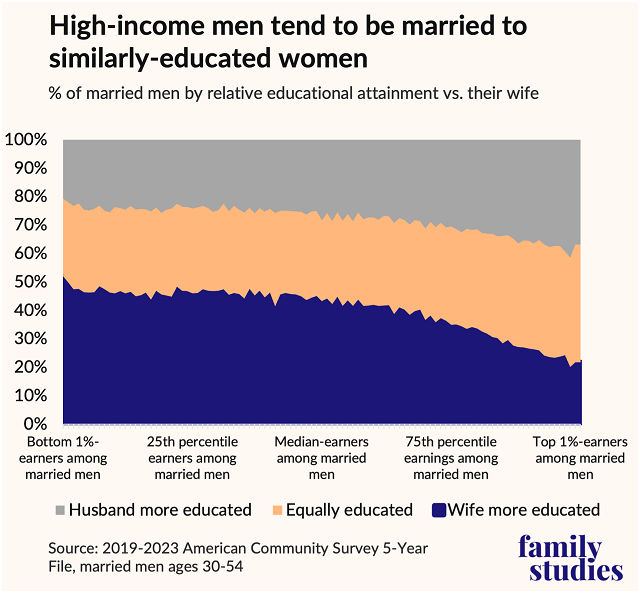
When it comes to education, it is true that poorer men tend to marry women who are more educated than they are, and richer men are likelier to marry women who are less educated than they are. To some extent this is just a statistical artifact: better education tends to lead to more income, so low-income men tend to be less educated, while higher-income men tend to be more educated.
Thus, what is perhaps most striking is that as income rises above the median, higher-earning men disproportionately marry women with identical educational attainment. Just as with age, so with education: high-earning men certainly could choose to marry far less educated women, but in practice they appear to prefer to marry peers. Moreover, while high-income husbands may be more educated than their wives, their wives still tend to be highly educated:
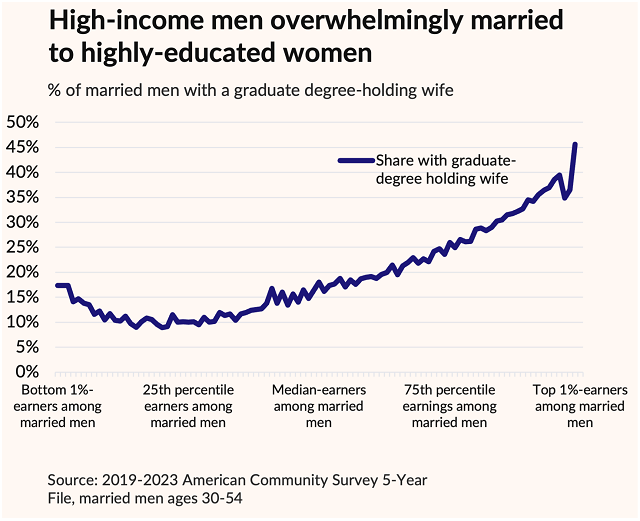
Among the lowest-income married men, many have wives with graduate degrees. For these men, their wife is often the primary earner for the household. But above the 25th percentile, the share of husbands who have wives with graduate degrees rises steadily. For married men in the top 1% of income, for example, 45% of their wives have graduate degrees. Clearly, high-achieving men often prefer to marry equally high-achieving women.
Rich Men Marry Rich Women
And finally, income. Do men with higher incomes tend to have wives with lower incomes, or higher incomes? It’s true that higher-income men do tend to earn a larger share of household income. Men in the top 2% of married men’s incomes tend to provide about 90% of the income of their households; men at the median range of income tend to provide about 64%; men at the 25th percentile tend to provide about 60% of the household’s income; and men at the 5th percentile tend to provide about 32% of the household’s income. So, yes, higher-earning men tend to marry women who earn a lot less than they do. But these women still earn a lot of money, on average!
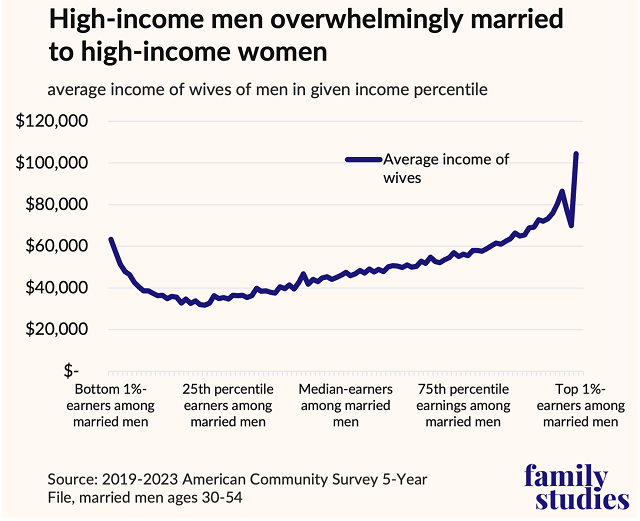
Whereas the wives of men at the 25th percentile of married men’s incomes earn, on average, only about $35,000 in income, wives of men at the 75th percentile earn about $56,000; and wives of men in the top 1% earn over $100,000. Yes, these are lower earnings than their husbands—but the average wife of a husband in the top 1% income bracket brings home six figures in income of her own.
Rich Men Also Prefer Stay-at-home Wives
High-earning men have a lot of options when it comes to choosing a wife. They overwhelmingly choose to marry highly-educated and high-earning women of a similar age or just a couple years younger. In other words, they marry peers. The idea that most husbands are threatened by female achievements is unsupported by the available evidence.
That said, achievement and ambition can take many forms, and need not center on the workplace. The wives of high-income men might pursue high-income jobs of their own—or they might direct their drive and ambition towards other pursuits. Indeed, it turns out that there is also a correlation between high-income husbands and wives who stay home (i.e. contribute less than 5% of household income and have total income under $15,000).
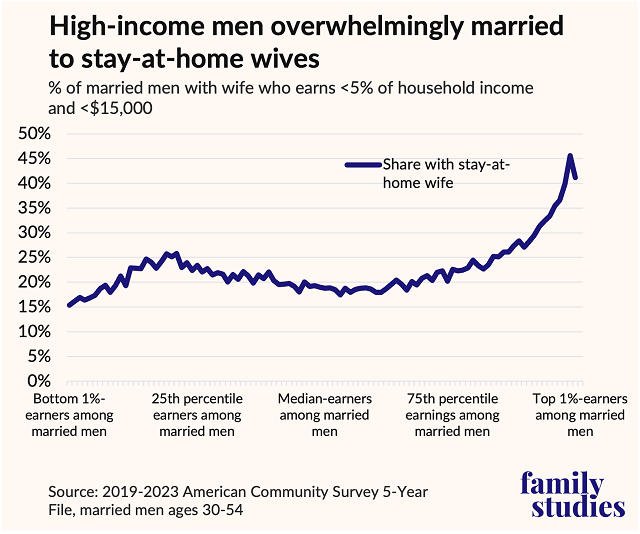
For married men in the bottom percent of income, about 15-20% of their wives are stay-at-home wives. But for men in the top 5%, about 40% of wives stay home. Clearly, while high-income men value higher achieving women, they are open to their wives being stay-at-home mothers.
Importantly, many of these wives who choose to stay at home have graduate degrees.
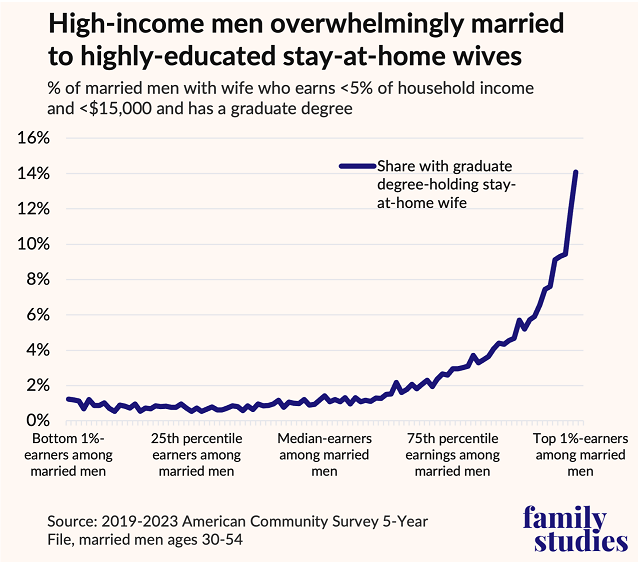
For high-income husbands, a highly-educated wife who stays home appears to be desirable. Almost 15% of men in the top 1% of income have stay-at-home wives with graduate degrees—these women could be pursuing lucrative careers. Instead, in most cases, they are raising children. They aren’t raising the children at home because the family can’t afford child care, but because the parents have decided that one parent staying home is consistent with their joint vision of life for their family.
How can it be that high-income husbands are selecting women for both high earnings and staying at home? Simple: people want spouses who are their peers. Peer can refer to age, education, income—or simply drive, capability, agency, or ambition. High-income men tend to be ambitious, and so they tend to be attracted to women with a similar mindset. But that ambition isn’t always career-focused. Some ambitious women do choose the workforce as their primary outlet for exercising agency in the world—but others choose their family, or their church, or their social community. The most popular trait that high-status men look for in a wife probably isn’t “education” or “income,” but something more like ambition, drive, vision, or determination.
Conclusion
As we have seen here, the stereotype that most men are “turned off” by ambitious women is likely completely wrong. Both sexes tend to be attracted to others who share their approach to life. That usually means a spouse who is close to their own age, who is also their peer in terms of schooling, income, or social class. But it especially means a shared sense of agency and engagement in life’s challenges. That’s why millionaire men don’t usually marry waitresses, however attractive they may be. High-status (in internet slang, “alpha”) men tend to be attracted to high-status women. Whether a girlboss climbing the corporate ladder or a homemaker and culture-keeper, it really is the case that when men have more choice in their mates, they choose peers.
Lyman Stone is Senior Fellow and Director of the Pronatalism Initiative at the Institute for Family Studies.
*Photo credit: Shutterstock













